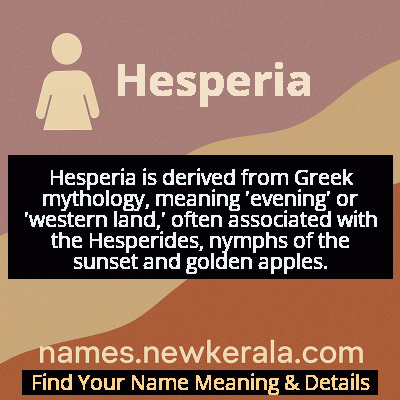Hesperia Name Meaning & Details
Origin, Popularity, Numerology Analysis & Name Meaning of Hesperia
Discover the origin, meaning, and cultural significance of the name HESPERIA. Delve into its historical roots and explore the lasting impact it has had on communities and traditions.
Name
Hesperia
Gender
Female
Origin
Greek
Lucky Number
9
Meaning of the Name - Hesperia
Hesperia is derived from Greek mythology, meaning 'evening' or 'western land,' often associated with the Hesperides, nymphs of the sunset and golden apples.
Hesperia - Complete Numerology Analysis
Your Numerology Number
Based on Pythagorean Numerology System
Ruling Planet
Mars
Positive Nature
Generous, passionate, energetic, and humanitarian.
Negative Traits
Impulsive, impatient, moody, and can be overly emotional.
Lucky Colours
Red, maroon, scarlet.
Lucky Days
Tuesday.
Lucky Stones
Red coral, garnet.
Harmony Numbers
1, 2, 3, 6.
Best Suited Professions
Military, sports, philanthropy, leadership roles.
What People Like About You
Courage, energy, leadership, generosity.
Famous People Named Hesperia
Hesperia (Mythological)
Nymph/Goddess
One of the Hesperides, guardians of the golden apples in the Garden of Hera
Hesperia Anderson
Botanist
Pioneering researcher in Mediterranean flora conservation
Hesperia Marlow
Astronomer
Discovered several asteroids and contributed to planetary naming conventions
Name Variations & International Equivalents
Click on blue names to explore their detailed meanings. Gray names with will be available soon.
Cultural & Historical Significance
The cultural impact of Hesperia extends beyond mythology into literature and geography. During the Renaissance and Romantic periods, poets and writers frequently invoked Hesperia as a symbol of idealized western lands and evening beauty. The name appears in works by poets like John Keats and Percy Bysshe Shelley, who used it to evoke images of golden sunsets and distant, perfect lands. Geographically, the name has been applied to various locations, most notably the city of Hesperia in California, which embodies the concept of a beautiful western settlement. This dual significance—both mythological and geographical—has kept the name culturally relevant across centuries, representing both actual western territories and the poetic ideal of evening's golden beauty.
Extended Personality Analysis
Individuals named Hesperia typically exhibit a unique blend of mystical charm and practical guardianship. They often possess an innate appreciation for beauty in all its forms, from artistic expression to natural wonders like sunsets and gardens. This aesthetic sensitivity frequently manifests in creative pursuits or careers involving art, design, or environmental conservation. Hesperias tend to be thoughtful protectors—whether of people, ideas, or traditions—much like their mythological namesakes guarded the golden apples. They often serve as the 'keepers' in their social circles, preserving memories, maintaining relationships, and protecting vulnerable individuals or causes.
Beyond their protective nature, Hesperias typically demonstrate remarkable balance between light and shadow aspects of personality. They can be both radiant and warm in social situations yet deeply introspective and private when alone. This duality allows them to navigate complex emotional landscapes with grace and understanding. Their connection to the evening symbolism often gives them particular strength during transitional periods, making them excellent mediators and problem-solvers. Hesperias frequently develop strong intuition and emotional intelligence, enabling them to understand unspoken needs and subtle dynamics in relationships. While they may appear mysterious or reserved initially, those who earn their trust discover loyal, insightful companions who bring both beauty and stability to their lives.
Modern Usage & Popularity
In contemporary naming practices, Hesperia occupies a unique niche as a mythological name that combines classical heritage with natural elegance. While it remains relatively uncommon, the name has experienced a gradual increase in usage among parents seeking distinctive names with deep historical roots and beautiful meanings. Modern usage is particularly notable in academic families, artistic communities, and among those with Greek heritage. The name's appeal lies in its combination of rarity and significance—it's unusual enough to stand out but carries substantial mythological weight. Current naming trends show Hesperia being chosen by parents who value both uniqueness and meaningful heritage, often as an alternative to more popular mythological names like Athena or Diana. The name's connection to nature (through its evening and western land meanings) also resonates with contemporary interests in environmental awareness and natural beauty. While it may never become a top-ranking name, its steady presence in naming databases indicates enduring appeal among those seeking names with both poetic quality and historical depth.
Symbolic & Spiritual Meanings
Hesperia carries rich symbolic meanings that extend far beyond its literal translation. Primarily, it symbolizes the beautiful tension between day and night—the magical 'golden hour' when the world transforms. This represents transitions, thresholds, and the beauty found in change itself. The name embodies the concept of guardianship and preservation, symbolizing the protection of precious things whether they be relationships, knowledge, traditions, or natural beauty. Like the golden apples in the mythological garden, Hesperia represents something of immense value that requires careful protection and appreciation.
Metaphorically, Hesperia connects to themes of western horizons and new beginnings. The west, in many cultural traditions, symbolizes the future, unknown possibilities, and the journey toward enlightenment or discovery. Thus, the name carries connotations of exploration and the pursuit of ideal lands or states of being. It also symbolizes the integration of light and darkness—not as opposites but as complementary forces that create beauty when balanced. The evening star aspect connects Hesperia to guidance and hope in darkness, making it symbolic of inner light and wisdom that shines during challenging times. These layered symbolic meanings make Hesperia a name that speaks to protection, beauty, transition, and the eternal human quest for balance and meaning.

